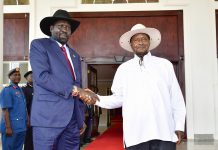AfricaPress-Tanzania: Local universities are still weighing on online teaching option in the wake of coronavirus which has led to suspension of academic activities.
Some academic dons believe the technology was relevant, but affirm it would take time before it is fully embraced for routine teaching.
“It may not be the best option for now. Tanzania is largely unprepared for it,” said Eliamani Laltaika, a senior lecturer with the Nelson Mandela African Institution of Science and Technology (NM-AIST).
He said online teaching can be an option during this critical time of Covid-19 outbreak which had seen temporary closures of all education institutions.
However, he told The Citizen yesterday when reached on phone that the problem with Tanzanians was attitude.
“Many people have low attitude to virtual lectures. Some believe it is either sub-standard or miss out some disciplines,” he said the law don teaching intellectual property rights .
He insisted, nevertheless, with or without Covid-19 online teaching technology was the way to go as it minimizes expenses and that outbreak of the pandemic was a wakeup call.
Lately, Dr Laltaika has been teaching law at the University of Iringa through online and will do the same for the University of Mines, Science and Technology in Ghana from next week.
However, he said online teaching was still not relevant for the primary and secondary schools although it has been partly embraced by some private schools.
Mr Charles Kadonya, a Tanzanian working with the East African Community (EAC) said online training had its limitations, especially for the public education institutions.
“Some parents cannot afford the laptops and Internet connections for video conferencing,” he said, noting the option could work effectively in future.
The Moshi-based College of African Wildlife Management (CAWM) announced last week announced last week that it was exploring the online teaching option.
However, college principal Prof Jafari Kideghesho admitted that the option has some limitations.
“Only some theoretical aspects can be conducted online. Field practicals cannot be conducted online,” he pointed out.
CAWM which was established in 1963 by Tanzania, Uganda and Kenya governments is a pioneer institution for the training of African wildlife managers from across the continent and beyond.
The outbreak of Covid-19 has not only led to its temporary closure but cancellation of various short courses planned for this year.
A number of courses at the college occasionally attract clients from abroad, particularly the United States and United Kingdom.
“Where possible, we are taking advantage of technology to run our courses online and to hold teleconferences,” he said when reached on the issue last week.
It has trained over 5,000 wildlife managers from 52 countries – 28 in Africa and 24 from outside the continent, majority of them worked in protected areas.
The Arusha-based MS-Training Centre for Development Cooperation (MS-TCDC), popular as Danish Centre, has mulled sustaining its teaching exercises through online technology.
“Learning would be sustained through electronic means. We are facilitating e-learning so that students from all locations do not need to travel to Arusha,” said Ezra Mbogori, the executive director.
The college attracts students from various African countries for degree and post graduate courses on leadership, governance, human rights and sustainable development.






